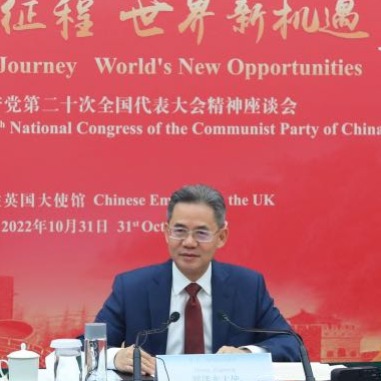



More than a dozen leaders of political parties and China experts gathered at a symposium in London on Monday to share their understanding of the report delivered by Xi Jinping, general secretary of the Communist Party of China Central Committee, at the 20th National Congress of the Party.
Zheng Zeguang, China's ambassador to the United Kingdom, gave a briefing of the gist of the congress at the symposium themed China's New Journey – World's New Opportunities.
"The congress has been held at a critical time as the Party and Chinese people embark on a new journey of the new era … The most important achievement of the congress is the election of a new central leadership," he said.
"And the report is a political declaration and a program of action for the Party, which brings together the Chinese people and leads them to achieve new success in building socialism with Chinese characteristics."

Zheng talked about three key Party events that have had profound historic meaning, highlights across 16 aspects of the Party achieved in the past decade, and the Party's objectives and strategies for the next five years and beyond. He also shared his thoughts on China's foreign policy and China-UK relations.
Andy Brooks, general secretary of the New Communist Party of Britain, said: "As China continues down the road of modernization of Chinese style socialism, communists all over the world are looking to see how the Chinese communists and the people's government that they lead will face the challenges of the next five years.
"China has become a beacon of hope for the peoples of the world struggling to build their own independent economies without imperialist interference."
Brooks said, while imperialist powers use their "military and economic might to impose their neo colonial rule throughout the third world, the Chinese people can and do provide the countries of Africa, Asia, and Latin America with an alternative source of high technology and economic assistance without the odious strings attached" that always accompany dealing with the West.
Brooks also praised China's foreign policy.
"China is strong, but it oppresses no one," he said. "It stays true to the principle of the equality of all countries – big and small, strong or weak, and rich and poor. It respects the development paths and social systems independently chosen by all the world's people."
Ella Rule, chair of Communist Party of Great Britain (Marxist-Leninist), said the Communist Party of China's fighting spirit and firm determination to never yield to coercive power struck her the most.
"This, I think, is extremely important in the present circumstances in which we're living in preparation for the tough challenges that face the world ahead," she said. "We welcome the strengthening of the Party and its new central leadership, which has been improved with tried and tested, hardworking loyal comrades.
"As Xi said, it needs a good blacksmith to make good steel. And I think this is what the 20th national Party congress has achieved in the appointments that it has made. The people of the world need a strong China, led by a strong Party guided by scientific socialism competently applied to current conditions."
Neil Davidson, a member of the UK's House of Lords, said the new development philosophy laid out in the report interests him the most.
"This shows a different way in which the world can be developed and is a message to many other economies that have not achieved development status," Davidson said. "China is now moving toward a high-quality economy and along that path in innovation. We already see remarkable innovations taking place within China in artificial intelligence, bio technology, quantum mechanics, and so on."
As a lawyer, Davidson was also drawn to the development of the rule of law in China.
"I think, too often, the UK and possibly the West generally doesn't understand the way in which Chinese law is developing at a remarkable pace," he said. "For the UK, it took us hundreds of years to develop our legal system, China is moving at a remarkable rate of progress toward developing its own legal system."

Stephen Perry, chairman of the 48 Group Club, said China's long-term central planning is needed in the West and urged people to pay close attention to the Party congress report.
"Capitalism with its multi-party system is unable, because of the general elections that are regularly held, to do anything in the way of long-term planning," he said. "And if one looks at the Party's congress report, one sees the important feature, the core feature of central planning."
He added that China "is becoming the world's leader in innovation".
"And we need to see where China is making its investment in innovation because those will be the important areas, where they're going to concentrate," he said.
Martin Albrow, a fellow of the British Academy of Social Sciences, said: "We are in an era of declining economic globalization and fragmentation, particularly in the Western world. And from that point of view, I think that the remarkable example that China shows is how to strengthen and provide stability."
He added that "when you stand with China", the stability "generates expectations on others that they can rely on China to respond in a certain way".
"What China says it does," he said. "There is a remarkable consistency between the statements that are made on behalf of the Chinese people and what eventually happens. Those three factors – stability, predictability, credibility, are the things which China is delivering to the world today, which the world, in its fragmented state, so much needed."
If you have any problems with this article, please contact us at app@chinadaily.com.cn and we'll immediately get back to you.